|
|
 |
 |
 |
| |
|
|
| |
 |
|
| |
|
Striking a Chord
Mia Morris investigates the increasing
inclusion of minority communities in classical
music.
Earlier in the year
(2005), the Annual BBC Proms at Royal
Albert Hall showcased vocalist virtuoso Bobby
McFerrin, and the African Children’s
Choir with jazz accompanist Michael Wolff, and
also later in the season Baaba Maal,
renowned Senegalese singer. And when last year,
the West Indies celebrated their 75th year playing
cricket at Old Trafford, they were greeted with
a musical - a commissioned piece performed, as
a joint venture, by the Halle
Orchestra and Manchester’s Moss Side
Youth Club. Further, John Holt, the reggae singer
is performing with the Royal
Philharmonic Orchestra. |
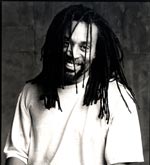
Bobby McFerrin
Link: Bobby McFerrin's
Personal Website
Buy Music: Bobby
McFerrin
Buy Music: Baaba Maal
|

John Blanke (small detail)
|
It would seem that
Classical music is attempting to broaden its
appeal and thus
developing groundbreaking work for potential
musicians and singers. However, we appear to
be still at
the stage where, at any given performance, there
will be one, possibly two, black faces among
the performers. Think of the painting of Henry
VIII’s
trumpeters. There is one lone black trumpeter,
capriciously named in the records as John
Blanke. At that time the black population
of England was only a few hundred.
Classical music was the popular music of its time.
This is no longer the case. It is a music that
we educate our young people into. An appreciation
of it usually comes from the music played in the
home, and with the learning of a musical instrument.
It is very much a middle class pursuit and often
not seen as being cool. This is so despite initiatives
in schools to promote an appreciation of classical
music. |
In America, early black classical performers
were discriminated against and had to leave America
to perform in Europe. Singers like Elizabeth
Taylor-Garfield, the ‘Black
Swan’,
performed in London between 1850-1860. Sissieretta
Joyne-Jones, referred to as ‘Black
Pattie’ to prevent confusion with white
soprano Adelina Pattie, formed the group Black
Pattie and the Troubadours in 1896. This extended
her career by 15 years. Her work survived by
mixing opera and theatre in order to showcase
talent.
|
In the 1950s & 1960s,
with the colour bar well and truly in place,
the only way for singers like Marian
Anderson to make her debut was to do
recital work. It was viewed at that time as the
quickest way to succeed. Hence Anderson, who
was the first black person to perform at the
New York Metro, skilfully incorporated a fusion
of Negro spiritual and classical music into her
repertoire.
It is now well over forty years since the historical
occasion in 1963, when Anderson performed to
over 75,000 people at the Lincoln Memorial, in
Washington. This moment was brought about as
a result of the refusal of the Daughters of the
American Revolution to let Anderson perform at
Constitution Hall. First Lady Eleanor Roosevelt
was so enraged that she resigned from this august
committee, resulting in the Secretary of the
Interior Congressman Harold Icke instigating
this event. Black Opera companies quickly formed
across the States during this period of revolutionary
change.
The legacy of black singers working in the genre,
has come full circle. Now professional black British
singers have to leave Britain to find work and
acceptance in the USA. This does not mean that
there is a lack of initiatives and new programmes
to involve ethnic minorities in Classical music.
The
Halle Orchestra is tackling the problem of
inclusion by taking classical music into communities.
The Halle run family workshops, with crèche
facilities, and have a number of residences working
with young people who are either visually or
hearing impaired. Halle are keen that audiences
get to experience a wide spectrum of music. They
worked with Moss Side Youth Club and a Sikh percussion
group. This culminated with the Hamming for
Halle which brought the orchestra together
with Reggae and Sikh music for that performance
at Old Trafford Cricket ground. There are numerous
similar innovative initiatives - too many for
this piece to give full justice and credit. There
is practically nowhere in the UK, no strata of
our society, where an orchestra widening participation
team have not reached. |
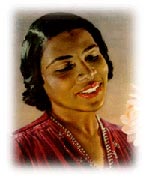
Marian Anderson
[Picture
Source & Biog]
Link: Marian Anderson
Biography
Books on
Marian Anderson, including The Voice That Challenged
a Nation: Marian Anderson and the Struggle
for Equal Rights by Russell Freedman
Buy Music: Marian
Anderson |
TV Programmes such as Operatunity on
Channel 4 (by Diverse productions) are showcase
talent. The winners of the season go on to perform
in grand opera houses, gain recording contracts
and tours, and this is just the beginning of the
rewards.
|

Alexander Pushkin
[Picture
Source. "Alexander Pushkin on his father's
side was descended from one of the oldest families
of the Russian gentry. His mother was the grand-daughter
of Peter the Great's Abyssinian Engineer-General."]
|
Theodore
Drury of Opera
Kids says
that playing instruments is the big challenge. "There
are no quick fixes. You have to practice and
develop a wide appreciation and love for music."
Chris Evans of the Royal
Philharmonic Orchestra feels that they
are leading the way with developing new audiences.
It is understood that they cannot afford to
offer orchestral experience only to "an
elite". They are leading initiatives in
prisons and youth clubs. The Henry Wood Promenade
Concerts were founded on the principles of
accessibility: informal, cheap concerts providing
everyone easy opportunities to hear the best
music and music-making in the world. In that
sense nothing has changed. The Proms continues
to reach out to new and diverse audiences to
ensure that future generations of Prom goers
have a chance to see the Proms. In addition
to the large-scale events for children, the
Blue Peter Proms and the BBC Children’s
Prom in the Park, they are working this year
on three schemes which develop contact with
new and younger audiences.
The BBC Proms: out & about events in May and
June with the BBC Symphony Orchestra and BBC Concert
Orchestra go to venues where they would not normally
go. The concerts aim to give 7-12 year old youngsters
and their families an opportunity to experience
live classical music of the highest quality, breaking
down the barriers associated with classical concert-going
and allowing them to interact with the orchestra
and experience the power and vibrancy of an orchestral
concert for the first time. |
Young composers aged between 11 and 18 are invited
to enter the BBC Proms sixth annual Young Composers
Competition and have their music performed by
top musicians and broadcast on BBC Radio 3. They
also get the opportunity to discuss their work
with leading musicians and composers.
Marketing Director, Andy Ryans of
the Halle
Orchestra says that they earnestly try to
utilise the publicity machinery and ensure that
all audiences are able to hear about their orchestra.
They have worked hard to develop good relationships
and programs which have clear goals, over a 3
year period, to work with the community and put
on something different other than western music.
Much of the work which has helped to reach new
audiences is done in tandem with organisations
like Arts About
Manchester. |
The Royal Festival
Hall has done admirable work in supporting and
developing mixed audiences and producing a broader
showcase of activities. They are one of the leading
exponents of family learning, and make good use
of non-traditional music forms. They have been
foremost in delivering Gamelan family workshops.
The Black writer Alexander
Pushkin is as revered in Russia as
Shakespeare in England. Samuel Coleridge
Taylor, poet composer is remembered
for the composition Hiawatha. In France, Monsieur
de Saint George, Le negre des lumieres
(see left), has been rediscovered.
|
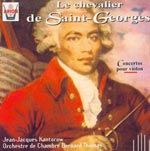 |
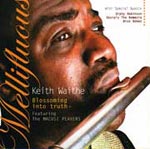
Keith Waithe
|
The
Black Cultural Archives, established
in 1981 in Brixton, organised a number of
classical
concerts in the Caribbean tradition in the
80s, where attending concerts and activities
in church halls, on the beach and in homes
was commonplace. On these occasions poems were
recited, storytellers regaled and singers sung
covering a range of music genres - folk, gospel
and opera. The concerts of the Black Cultural
Archives took place at the Queen Elizabeth
Hall and The Commonwealth Institute. They were
a critical turning point for many black performers.
They trail blazed individuals such as Guyanese
flautist Keith Waithe (Personal
Website) and
composer Shirley Thompson.
It saw the debut of Kora player Tunde
Jegede (Personal
website), and Clement
Ishmael.
Clement Ishmael, Conductor
and Music Director of Disney’s Lion
King, has worked across all music genres.
His original training was as a conductor, and
agrees on the pivotal role that the Black Cultural
Archives played some twenty two years ago when
they commissioned himself, Shirley Thompson
(Interview
in Jamaica Gleaner), Errollyn
Wallen (Personal
Website), and Keith
Waithe to
perform at the concerts mentioned. These performers,
all these years later, are still working in the
field and the hard work is paying off. They have
all paid their dues in the community by teaching,
sharing and playing. |
At last years 42nd
Anniversary of Jamaican Independence, celebrated
at St. Martins-in-the-Fields, traditional Negro
Spirituals were given the operatic treatment
sung by Marie Garrison, a teacher
taking sabbatical to pursue and develop her musical
career together with Robert Anderson and
Pianist Maxine Franklin (Biog).
In interviews with Ishmael, Waithe and co, we
find they are immensely proud and passionate
about how their careers developed. Like most
of the people we spoke to, whether they be in
Composing, Performing, Marketing, Education or
Commissioning work, they are concerned about
underlying issues. There is a genuine interest
and desire to see classical music broadening
its horizons. There is concern about how music
is taught and the lack of time devoted in the
curriculum. They are really alarmed at ever decreasing
opportunities to play instruments which makes
it virtually impossible for some young people
to master their instruments. There are additional
concerns related to developing clear sustainable
strategies and stable funding so that the work
can flourish.
Tony Henry (Personal
Flash website)
shared strategies which helped him to develop his
career.
Tony is
currently enjoying unprecedented acclaim for his
work but it was not always like this. ‘I
have had to learn a lot, first of all the talent
is important, so is the ability to take constructive
criticism [however painful].’ |
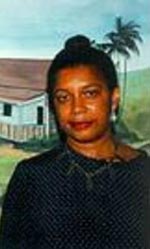
Maxine Franklin
(Picture
Source)
|
He goes on to say, ‘I
have learnt a lot about paying a lot of attention
to the competition and where you are within it.
It may come as no surprise but really the better
you get, the more you have to learn. Any teacher
out their worth his salt will insist you embrace
that. And finally, set your goals high. Have
faith in yourself, practice, practice and practice.
Bearing all that in mind have fun.’
|
He also shared his
views on developing and stimulating new audiences, ‘There's
a growing audience that's getting into classical
music and it's clear the momentum is going to
continue. But there's an awareness of how hard
it is to create decent singers/musicians. We
live in a culture where increasingly people are
looking for the easiest option and we have to
remind them that an acquired taste needs to be
worked at. Opera is the new cool, the more people
get that, the greater the audience. There are
foundations in place for up and coming musicians
but I'm not sure what to do beyond.’
The access to tutoring and instruments is also
patchy and in some instances inconsistent. There
are some music shops now who have systems set
up where you can hire an instrument and buy it
at the same time. Not everyone is aware of this
opportunity says Simon Pickett former
Bassoon player and now Education Director of
Halle. |

Tony Henry
|
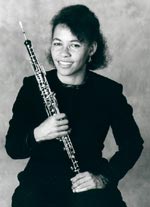
Althea Ifeka
|
Althea Ifeka (Personal
Website) is of English and Nigerian Heritage
and grew up
in Australia. She plays and teaches the Oboe
and Cello, ‘I have been a musician for
twenty five years, truth be known I could not
do anything else. I really enjoy teaching young
people and know from my own records that 70 per
cent of the people who I tutor are from multi
racial communities. Parents, in particular from
the Caribbean, are passionate about education
and are keen for their young people to develop
a range of interests.’
As Dominique Le Gendre composer
and guitarist put it, ‘we knew more and
embraced more from Europe than Africa, so when
I came over from Trinidad as an adult I knew
my Dickens, Auden, Yates and Shakespeare.
Whatever happens you need to have an audience,
you need to be able to train the young people
to appreciate music across the genres and have
an understanding of where classical music fits
in. Changes will only take hold once you have
been exposed.’
[The
Arkangel Company recorded all thirty-eight
of William Shakespeare's plays, complete and unabridged.
Each play features original music
composed by Dominque Le Gendre] |
Clement Ishmael,
all round music composer, conductor and organiser
started playing music with established white
choirs, it took a long while for his work to
be recognized and funded by the Arts Council.
What he had to do in the end was to ring them
and let them know that he would not be applying
again. He feels that things have improved as
there was a time when his work was pigeon-holed
and that certainly held him back.
He says, ‘I ensure that I am involved
with working with children’s opera companies
like W11 based in Notting Hill. It is vital that
black people are seen in all aspects of music,
lighting, conducting, singing and playing. The
only way you can get a feel for what the issues
are is going back to the pipeline. Are black
and minority ethnic young people applying to
study music? … how does the career fair
after they have completed? Like all aspects of
life now…it is the competition.’
|

Tunde Jegede
|
We managed to speak
with Wayne Marshall in Austria
while he was conducting West Side Story. He says,
‘I grew up in Birmingham and when my parents arrived from Barbados in
the 50s they carried on the traditions of going to church as a family, and
appreciating all types of music. My mother played the piano, and I followed on
from this,
coupled with working hard at school. … my main spring board after leaving
the Royal College of Music was to work at St George’s Cathedral Windsor
Castle as an organist and concert pianist. Another turning point was working
in Glyndebourne ’86 where I worked on Porgie and Bess. This is
where I met Simon Rattle and my current management team.
My parents ensured that I wanted for nothing and
encouraged my interest and perseverance in music.
I know no other way of life. The times are different
now and young people have so many choices that
pull on their time. All I know is that you need
to put in the work of practicing continuously when
you are young, as this is what paves the way for
you in the long run. I remember practicing, when
I was younger, 6-7 hours. If you know this is what
you want to do, this is what it takes. People do
not ignore good talent.’
Jean Nicholls, General Manager
of The
Birmingham Opera Company talked about recruiting
and identifying emerging talents.
‘I suspect that they have underestimated
that communities are reflected in what they are
seeing and people feeling comfortable. Going the
extra mile to make it clear we will audition good
people working in non theatrical venues has helped,
including opportunities in our work opportunity
to see from the inside, that has been powerful
to strip away the mystique Opera comes from the
heart. Many of the stories are still strong… good
stories now.’ |

Rodney Clarke
|
Rodney Clarke
(Personal
Flash Website) attended
Dulwich College. He is of Jamaican won young
Baritone singer of the year studied at the Royal
Academy. He secured £20,000 in prize money
which enabled him to concentrate full time on
developing his musicianship.
Last year at a Black Music Congress debate looking
at white artists involved in black music, the
'pop' music industry was charged with institutional
racism. There is so much evidence testifying
to the fact that record companies routinely spend
more resources on white artists performing black
music than on their black counterparts. I don't
think matters are so clear cut within classical
music. Yes, there is institutional racism in
that generally speaking there is little access
or pro-active engagement of black artists. Also,
the few black artists who strike
out on their own seldom make any meaningful progress,
despite evident talent. However, it could be
argued that there is not racism or colour bar
at work, and that the paucity of black talent
within classical music is simply because most
neither relate to or aspire to build their career
around classical music. There is some truth in
that. |
To find out about
promotion of classical music by ethnic minorities
we contacted
some different ethnic groups. Kwaku is
the founder of the Black
Music Congress. He says
the Asian Music Circuit is the UK’s premier
touring company for music from all over Asia.
Funded by the Arts Council of England since 1991,
it is
an independent company with charitable status,
whose mission is to bring the best of Asian music
to the British public. The Asian Music Circuit
works with a wide variety of concert and festival
promoters in the UK and Europe to produce a range
of quality tours each year. It works with new
and upcoming artists as well as top-level performers,
promoting classical, devotional, folk and contemporary
Asian genres. The Asian Music Circuit also runs
a comprehensive education programme, which includes
public workshops by visiting artists, school
projects
and the annual Indian Music Summer School. |
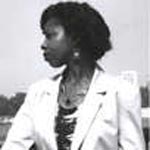
Shirley Thompson
(Biog
& Picture Source)
|
We also contacted Terry
Childs London branch of officer of
the Musicians
Union who had this to say in regards to
complaints of racism from Black and minority
ethnic members. No incidence has been recorded
of any members experiencing racism during auditions
or playing.
Black History Month is
celebrated in America, Canada and Jamaica in
February and in the UK in October. In the UK,
black organisations and community groups organise
events and activities which platform both current
and historical participation in diverse areas.
The historical associations with classical music
are often surprising.
Mary Seacole was a Jamaican
Nurse who fulfilled her ambition to nurse soldiers
in the Crimean war despite being denied the opportunity
by Florence Nightingale. Seacole’s life
was celebrated over a three day period in Sussex
Gardens, the home of St Thomas’s hospital.
Classical music was a big feature of the festivities.
|
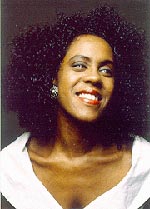
Errollyn Wallen
(Picture
Source)
|
In 2000, Larry
Coke and his company, GyeNyame for
Performing Arts, staged an aria in her name
which was performed at the Linbury Studio Royal
Opera House. Seacole also won the prestigious
100greatblackbritain awards held earlier this
year. The Black
Cultural Archives will be organising
(and are looking for partners) a fundraising
classical music concert to take place in late
2005. It will celebrate the finding of a permanent
home in Brixton after a long search of twenty
two years.
Partnership is the
name of the game across all aspects of work in
the UK e.g. in initiatives like Gain,
managed by the Arts
and Business, Arts
Council England, Decibel and
the Greater
London Authority. Black and minority ethnic
people are actively recruited on to the boards
of key London arts organisations including the London
Philharmonic Orchestra, Photographers
Gallery and the Royal
Opera House. Key movers and shakers from the community are
enriching boards as trustees. They include former
MP Paul Boateng, academic Stuart
Hall, lawyer Karen McHugh,
journalist Baz Bambigoye, writer
and social commentator Bonnie Greer,
and academic and cultural strategist Baroness
Lola Young. |
Nitro,
formerly the Black Theatre Co-op and the Royal
Opera House produced a joint event, Nitro at
the Opera. The event held in November 2003 at
the Royal
Opera House was an unmitigating success, with
over 1200 people attending the activities spread
throughout
the afternoon. Events took place throughout
the venue and good use was made of the 5 crush
bars
and the Linbury studio. Performers who showcased
at this world premiere included nine black
British composers who are successful and established
artists
in a wide variety of musical fields.
 Nitro
at the Opera (Pic
Source) Nitro
at the Opera (Pic
Source)
The event
included family workshops and comedy plus
the opportunity to perform alongside and meet; Nicky
Brown, Dainty
Drysdale, Errollyn Wallen, Ola
Onabule (Personal
website), Orphy
Robinson (Personal
website), Alex Wilson, Clement
Ishmael and Dominque Le Gendre. |
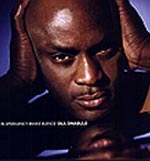
Ola Onabule
Link: A
Nitro at the Opera:
Preview of Nitro's day-long festival of black music-theatre
throughout the Royal Opera House Nov 2003
Link: A
Nitro at the Opera Guardian Review November 11, 2003
|
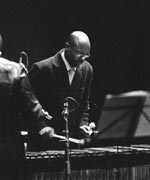
Orphy Robinson
(Photo
source)
|
Activities of this
proportion do not come overnight, but are literally
as a result of the relationship building between Deborah
Bull, Director of Royal
Opera House (RHO2) who first met with the
composer, musician and artistic director of Nitro
theatre company, Felix Cross.
Bull was keen to create partnerships between
these two art forms, theatre and opera, in order
to create the pilot Nitro at the Royal Opera
House Festival. This activity took over two years
from initial brainstorming to running the pilot
activity, which led to the significant breakthrough
of the first woman composer and the first black
person to compose an opera for the Opera House.
It will premiere in Autumn 2006. Dominic
Le Gendre’s work, has come as
a direct result of this innovative event.
Before we went to press we spoke with a very excited
Dominique who is currently on holiday in the wilds
of Scotland. ‘ I never imagined or envisaged
that I would have had the opportunity to perform
my first major piece of work with the Royal Opera
House and contribute to making history.’ Dominque
states these initiatives are fantastic as this
type of activity should be part of succession planning
but it is important that young people who engage
in all these programmes feel that they can continue,
and that clear paths are evident. Succession planning
is critical so that future generations will feel
empowered and confident. |
So is there institutional
racism in British classical music? The evidence
points to hurdles. Fierce competition, and a
lack of clear path objectives are just a couple.
Continual
strong initiatives to involve young people, and
the highlighting of successful contemporary and
historical individuals will contribute to increasing
inclusion of minority communities in classical
music at every level. [MM 18/09/05]
Relevant Additional Links
- Black
History & Classical Music: Composers & Musicians
of African Descent
- Jamaica's Classical Musicians
- The
Negro Music Journal [NMJ] -
"The Negro Music Journal: A Monthly Magazine Devoted
to the Educational Interest of the Negro Race in
Music was published in fifteen monthly issues from
September 1902 to November 1903 in Washington,
D. C....."
- Buy Music: Striking
a Chord - A category in our online
shop which contains a selection of music created
by some of the artists
featured in this article.
 Famed
opera singer Marian Anderson lived in Danbury,
Connecticut for over 50 years. On
February 27th & 28th 2005, the US Postal Service
joined with the Danbury Museum & Historical
Society in dedicating the
Marian Anderson stamp. The museum still have some
cancelled cachets
left at $10 each. Contact
the museum to purchase. Famed
opera singer Marian Anderson lived in Danbury,
Connecticut for over 50 years. On
February 27th & 28th 2005, the US Postal Service
joined with the Danbury Museum & Historical
Society in dedicating the
Marian Anderson stamp. The museum still have some
cancelled cachets
left at $10 each. Contact
the museum to purchase.
|
|
|
back to top
All material
contained within this website is property of the
respective owners and cannot be used in any
form without prior consent. If you use material from
this web
site you accept that you will be liable to all costs
arising from its use. |
|
|
| |
 |
|
|
| |
|
|
|
|




